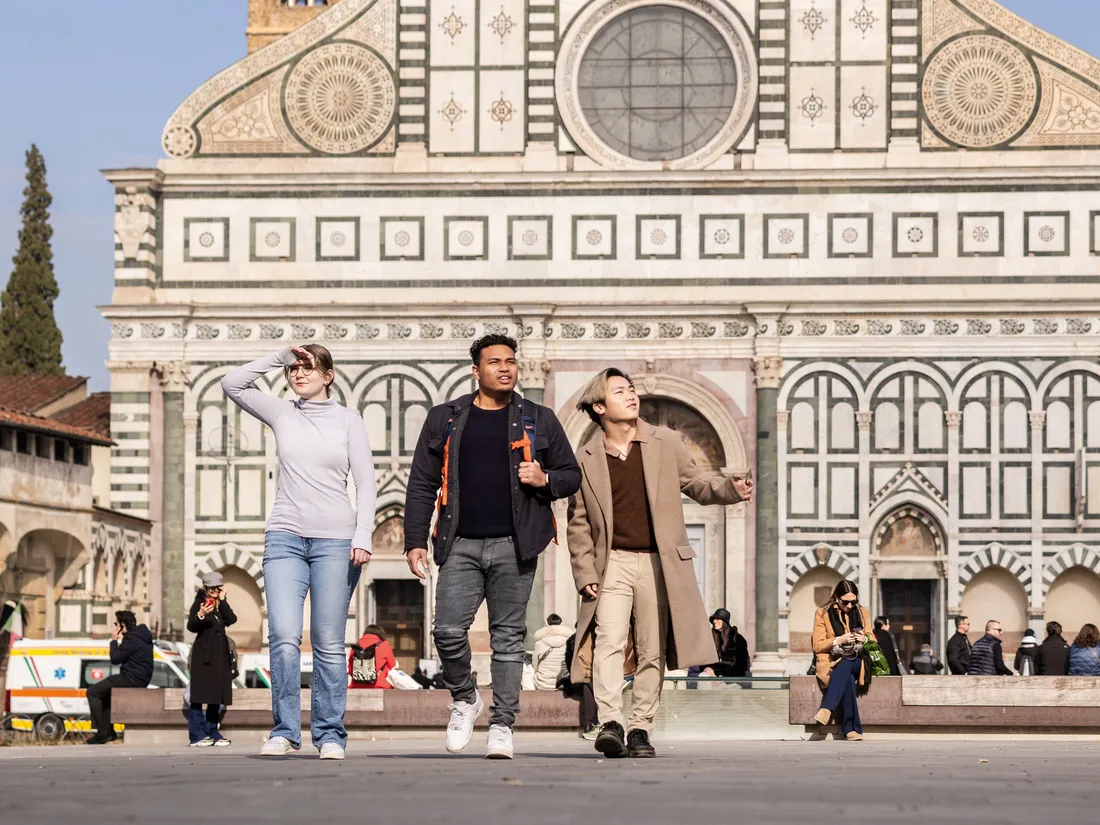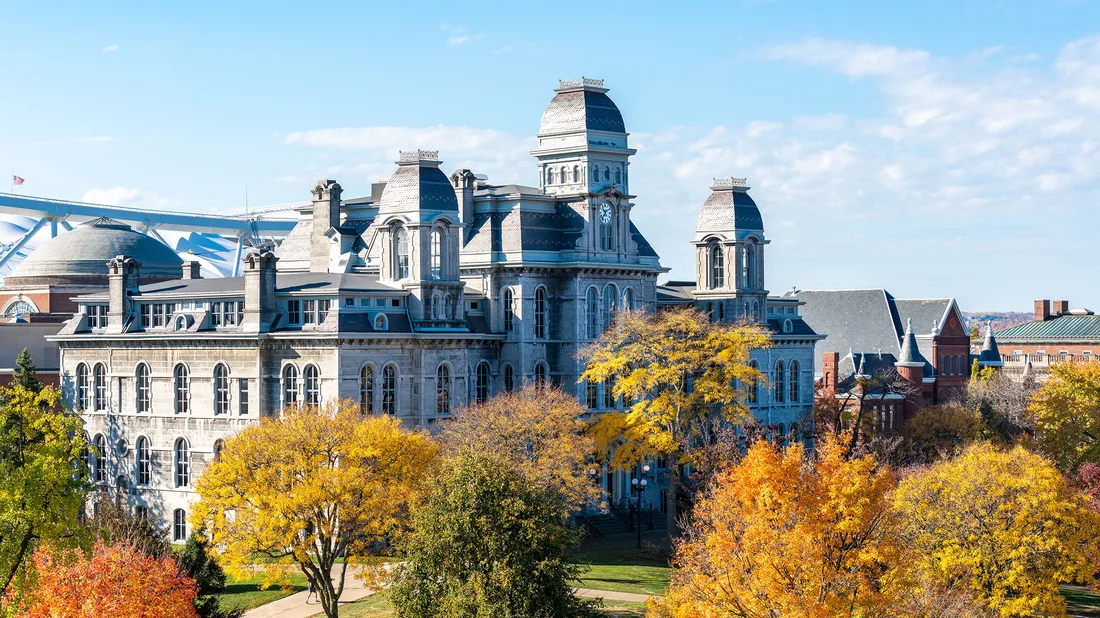
Cafui Awasu and friends from the Syracuse Santiago program sandboarding in the Atacama Desert in Chile.
When Cafui Awasu reached the crest of the dune, she paused and took in the view. Craggy rock formations spread in every direction to a ring of snowcapped mountains in the distance. In that moment, she realized the apprehension she’d felt at the start of her hike was gone. “I stopped worrying about catching my breath because I was already breathless,” she says. “This was the most stunning place I’d ever seen.”
This weekend excursion to the Atacama Desert was part of the Syracuse Abroad Santiago program. It had included nighttime hiking in Valley of the Moon, watching dawn break through the mist of natural hot springs, and an opportunity for sandboarding. For Awasu, it captured the essence of her six-month study abroad experience: It was beyond anything she had expected or imagined—it was challenging and profoundly rewarding.
New Perspective
Awasu, now a senior with a double major in management and entrepreneurship and emerging enterprises and a minor in Spanish, grew up in a rural community in New York state. She navigated the challenges of being one of the few students of color in her high school by actively engaging in sports and clubs. Awasu was most comfortable when she had a sense of control, so when her mother warned that she’d have to “go with the flow” while studying abroad, she was reluctant to accept the advice.
Upon arriving in Cuenca, Ecuador, for a month-long Spanish immersion program in preparation for a semester’s worth of courses taught in Spanish, Awasu accepted the wisdom of her mother’s words. Despite years of Spanish study, immersion in Spanish-speaking daily life was initially intimidating. She realized that fluency was going to take time and work, and that she would encounter much that was new, unpredictable and perhaps not readily comprehensible. “It sank in that many things—culture, weather, transportation—were beyond my control,” she explains. “I realized that to get the most out of this experience I was going to have to adjust, adapt and put in some effort.”
Unexpected Rewards
Awasu’s approach yielded rewards from the outset. In Ecuador, families gather midday and eat a big meal. She recognized the importance of this custom, so each day she walked 45 minutes to and from school, regardless of the weather, to be with her host family for lunch. Her efforts led to a close relationship with her host mother, with many precious moments. “Soon we were doing things like going out for ice cream together, or I’d help her in the kitchen cutting potatoes while she told me gossip about people going by,” Awasu says.
A willingness to step out of her comfort zone proved valuable in academics as well. When registering for classes in Santiago, Awasu was alarmed to discover that a class she’d planned on taking was already full. As an alternative, program director Mauricio Paredes recommended a course on Chilean economics. “At that time, I was still nervous about taking classes exclusively in Spanish,” Awasu says. “I asked him if it would be easy. He looked at me over his glasses and said, ‘Do you want it to be easy or do you want to learn?’”

Cafui Awasu and friends on the streets of Buenos Aires, Argentina, where they traveled with the program.
Awasu was the only foreign student in the class taught by esteemed Chilean economists. “The first week, I understood not a word—my notebooks are full of me just practicing cursive,” she says. But she tackled the assignments wholeheartedly. “In the end, I learned so much,” she says. “My research for the final project centered on grape farming in northern Chile, but really what I learned about is the interconnection of trends in culture and politics with economic and environmental realities.”
Adjusting to unexpected challenges helped Awasu discover her leadership capabilities. One weekend she and friends from the program decided to explore wine country in Argentina, but when they arrived, they discovered most places were closed for a holiday. Disappointment turned the group’s mood sour. “So my friend and I went out for a walk, discussed what to do and came back with a positive attitude,” she says. “It took some conscious effort, but eventually everyone shifted their outlook and we had an amazing time.”
A Global View
As part of their studies, the Syracuse Santiago group traveled to Uruguay, Argentina and different areas of Chile to visit significant sites and learn directly from scholars and survivors about recent dictatorships and rebellions. These experiences led to what Awasu describes as a visceral appreciation for history and its ongoing impact.
Studying Chilean history gave her new insight into the history of other countries. “Some nights I would be up until almost dawn reading about Ghana and Jamaica, where my father and mother are from. I discovered so many parallels,” she says.
A Look to the Future
The idea of taking part in the Syracuse Santiago program was exciting, but actually committing to it required a leap of faith. As a Renée Crown University Honors Program student and a Whitman Leadership Scholar , she was concerned about staying on track with her coursework and internships. “But I asked myself, ‘In 20 years what will you be glad you did?’ and knew I had to make it happen,” she says.
In Santiago, Awasu interned with an ecotourism startup. Her responsibilities included independent research, analysis and presenting recommendations. “I learned this is the work I really love doing—and it’s applicable not only in startups, but in any company or organization where there’s a desire to improve. Now I know what I’m aiming for when I start looking for jobs after graduation!”
But the most valuable takeaway from her experience abroad, Awasu says, was personal growth. A particularly satisfying indicator of the independence and confidence she’d gained occurred when her parents visited mid-semester and she guided them around Santiago. “Knowing how to get around is an important signifier of self-sufficiency to my father,” she notes. Her father was thrilled to see how skillfully she navigated Santiago’s busy transportation system: She was fluent in Spanish and comfortable finding her way through the unfamiliar. Her parents, proud Syracuse University alumni who met in graduate school, had tested her readiness to enroll at Syracuse as a first-year student by dropping her off in a distant parking lot with the order, “Meet us at Schine!”
“What I learned in study abroad is to let go of expectations and handle things as they actually are,” Awasu says. “Mauricio Paredes was always telling us to ‘Be flexible!’ And by the end of the trip it’s what we were telling each other, too.” With this perspective, she knows she can pursue her dreams and take risks. “Reality might feel rough sometimes,” she says, “but I learned that the rough spots are the good spots, if you can go with the flow.”


